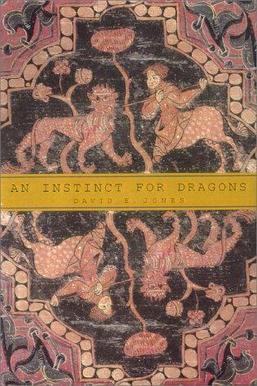- cross-posted to:
- [email protected]
- cross-posted to:
- [email protected]
TIL that in the work, An Instinct for Dragons, an anthropologist argues that the universality of dragons across human societies is due to evolutionary reasons, with common primate predators being merged into a hybrid monster.
I still have deep-seated, instinctual nightmares of the merg.
Your post is right up there with that askouija: Put your money in the bag, this is a bag
Ha! I wrote a paper about the meaning of dragons for a undergrad anthropology college course in 2003 and I cited the heck out of this book. Also Mythical Beasts edited by John Cherry.
well we’re waiting_judgesmail.gif I mean…dude. You gotta tell us what you got on the paper. How’d you score?
Oh wow. No one ever asks about my undergrad grades anymore. It was a study-abroad in London, UK at Goldsmith’s college. I got whatever a UK “D” was at the time, a 55 or something. Thankfully I came with a study-abroad program guide who gave us a “US Grade Equivalent” sheet at the start which said that was a passing grade and I didn’t worry about it. For the course “Animals In Medieval Art and Literature” which became 3 credits of Anthropology at my local state university in the United States toward a Bachelor’s in Science the following year. I entered grad school 4 months after that in an unrelated field and never used this knowledge for anything but trivia since.
Does he offer an explanation on why dragons are winged in plenty myths?EDIT: raptors, illiterate me. Raptors.TL;DR- dragons are what happen when you mash together big cats, big snakes, and big birds of prey
Got it - thanks. My sight simply skipped past the “raptors” part.
[Thanks also @[email protected] ]
The linked article mentions that one of the predator types merged into the dragon is raptors (as in birds of prey, not velociraptors)
They’re big and scary enough today, and in the past they were even bigger and scarier.
https://en.wikipedia.org/wiki/Haast's_eagle
Relationship with humans
Some believe that these birds are described in many legends of the Māori mythology, under the names pouākai, Hakawai (or Hōkioi in the North Island).[52][53] According to an account given to Sir George Grey—an early governor of New Zealand—Hōkioi were huge black-and-white birds with yellow-green tinged wings and a red crest. In Māori mythology, Pouākai would prey and kill humans along with moa,[54][55][56] which scientists believe could have been possible if the name relates to the eagle, given the massive size and strength of the bird.[52][57] However, it has also been argued that the “hakawai” and “hōkioi” legends refer to the Austral snipe—in particular the extinct South Island species.[58]
For context, Haast’s eagle was about twice the size of today’s Harpy eagle, which itself looks like it came out of a nightmare. See photos at https://www.demilked.com/giant-bird-harpy-eagle/
It was endemic to New Zealand, which was first inhabitated much too late for this bird to become the common trope that dragons have been in many cultures.
It seems more likely that it comes down to fossils.
This would be a bear not a lizard. Idiotic premise.



